#existential progressivism
Explore tagged Tumblr posts
Text
Quidditism


Quidditism is an ideology and a movement that seeks to take peaceful action to push the world towards an accepting, tolerant and fully free future, where everyone can thrive without fear.

Why quidditism?
The word 'quiddity' has 2 major definitions. The first one being "whatever makes something what is is, the essence". The movement seeks to establish a world where everyone is allowed to fully embrace themselves and who they truly are. In other words we wish for people to embrace their essence. The second definition of the world 'quiddity' is "deviation from an established pattern or norm, eccentricity". The quidditism movement focuses on marginalised identities such as LGBTQIA+ identities or paraphilias as these people are not allowed, in today's society, to flourish as themselves without fear. In other words, the liberation and normalisation of people considered eccentric, whether it be by their gender presentation, attraction or neurodiversity, is central to our goal.
Emoji Code -🪷💫

Quidditism's core values
Now, let's go over quidditism`s beliefs and summarize them.
Radical Inclusion
Radical inclusion is the first of the values we'll go over. Being a radical inclusionist means accepting all 'good-faith' identities. But what even is a 'good-faith' identity?
There are 2 main criteria for an identity to be of 'good-faith'. The first one being that the identity is genuine, and not taken up to prove a point, to grift, or to be generally disingenuous. In other words, if you genuinely identify with it, this box is checked. The second criteria is the one where controversy arises, It is generally defined as being harmless. However, what is considered harmless may vary from individual to individual. Quidditists generally consider that as long as it doesn't do any real world harm (like taking up limited resources, although it is rare a simple identity can achieve this) and tries it's best to be non-offensive and non-bigoted, the identity is good faith. In other words, identifying as a transvestite because it feels right to you, and while having read up on the terms history is completely good faith, however identifying as the same thing to try and mock trans people isn't.
So, quidditists are radically inclusive: they support any genuine identity that does its best to be harmless.
Limited Contact
Now, we talked about paraphilias above. A paraphilia is defined as an unconventional sexual attraction. In our day & age, homosexuality isn't considered one, however back when the fight for the LGBTQIA+ community was far less advanced, it was considered a paraphilic disorder.
Wait a second, what even is the difference between a paraphilia and a paraphilic disorder? Nothing except the "disorder' part, aka the factor of "is it causing harm or distress to you or people around you". However, paraphilias are never inherently considered disorders in quidditism.
Having said that, we consider them the same way as we do kinks and fetishes. They are cousins after all: kink regroups all use of unconventional sexual practises or fantasies while fetishes are a form of sexual desire strongly linked to a particular thing or activity. They overlap a whole lot, don't you think? In general, we will use these terms interchangeably.
Now that that is cleared up: what is limited contact? Limited contact is a stance that regroups a bunch of beliefs about paraphilias and acting upon them. If you would like to read more about it, the rentry is a good starting point. You could summarise these beliefs by "if it is consensual, it's fine", but you would need to define consent for this. So what is consent?
Consent, as a noun, is defined as the permission for something to happen or the agreement to do something. As a verb, it is defined as giving permission for something to happen or to do something. Additionally, anyone who consents must be able to back out and change their minds at any point before, during or after what they initially consented to without fear of repercussions. They should also feel free to give (or not) their consent in the first place, and not be forced to do so.
There are a few points from the limited contact view that we will examine further here. Firstly, consenting to sex in itself is a complex thing and not just the act of understanding and agreeing, so there must be both a technical understanding of sex along with an emotional understanding of sex for consent to truly be possible. Secondly, anyone of age and not under the influence can consent before regression, use of substance, sleep or death. Thirdly, minors cannot consent to people over/under 3 years of age from them due to lacking proper emotional maturity as well as a gap in the emotional understanding of sex that comes with life and lived experiences. And lastly, animals cannot consent to sexual acts due to not having the cognitive ability and speech for it. Additionally, just because an animal's body enjoys an act does not mean they consented to it, as consent is a clear agreement and acknowledgement, not body language or what you perceive.
Total bodily autonomy
Bodily autonomy is defined as the right to make decisions about your own body, life and future, without coercion or violence. When we say total bodily autonomy, it isn't trivial. In today's world, abortion access and rights are threatened more and more, women are still subject to genitalia mutilation at a very young age in multiple countries, and trans people need to jump through hoops to get gender affirming care. But to us, it doesn't stop there. We want to fight so that everyone has the right to make informed choices on what they do with their body and life, whether that's extreme body modification, gender affirming care, abortion, or just a tattoo.
Anti-psychiatry
Anti-psychiatry is the view that psychiatric treatment can often be more damaging than helpful. Do not the often in the above sentence. So, what does that mean in practise? A few things.
Psychiatric care should be entirely optional. Whether you want to recover with psychiatric help, by yourself or even not al all, you should be given all the necessary information to make that choice for yourself. This ties back in with the last point, total bodily autonomy, and with the next one.
Chosen Recovery
We've spoken about informed total bodily autonomy and what that would mean in psychiatry: the option to seek recovery or not. Here, we are extending this beyond psychiatry. We believe that no matter what you might have that could be recovered from, you should get to choose whether you want to or not. First, we believe that that is your right, and second, we are horrifically aware of the fail rates of forcing someone into recovery: as a general rule of thumb, if someone doesn't want recovery, they won't recover, no matter what you try. That doesn't mean you can't bring the option to their attention, just that ultimately, it is their choice, and theirs alone.
Transhumanism
Following up on all the bodily autonomy related beliefs, we have transhumanism. It is a movement that advocates the enhancements of the human body and condition by developing and making widely available new and future technologies that can greatly enhance longevity, cognition, and well-being. That would include wing or animal ears implants for transspecies folks, to only cite one of many examples.
Realmism
Realmism is an ideology based around the belief in magic and the multiverse. It promotes all faiths and religions, as well as the practise of reality shifting and the right to outlandish, weird, and uncommon beliefs, with an emphasis on being pro-delusion. If you wish to learn more, the entry on transid.org goes into more details.
Existentialism
Existentialism is the philosophical belief we are each responsible for creating purpose or meaning in our own lives. It isn't given to us by an authority. Whether you choose to seek it in faith, the arts, social causes or just your own happiness, it is entirely yours to craft.
Pacifism
Pacifism is a commitment to peace and an oppositioin to violence, war in particular. The quidditism movement believes that unless strictly necessary, violence should never be used, defining it as a last resort. How do we achieve our goals then? Educating.
Punk
Quidditism follows a very punk-ish ethos. The punk ethos is primarily made up of beliefs such as non-conformity, anti-capitalism, anti-authoritarianism, anti-corporatism, a do-it-yourself ethic, anti-consumerist, anti-greed, direct action, and not selling out".

Resources
🪷 Discord Server
💫 Blog

#quidditism#progressive punk#existantial punk#exipunk#existance#fleur community#liom#liom community#liomogai#mogai#mogai community#existentialism#transhumanism#punk#anarchy#pacifism#limc#rqc#rq#radqueer#pro para#profiction#proship#anti censorship#progressivism
6 notes
·
View notes
Text
"The Democratic party is more progressive than it's ever been!!"
The people you're trying to argue with are talking about fiscal policy. You're talking about social issues. The current mainstream Democratic party is fiscally conservative, pro-corporation, anti-union, anti-regulation, pro-privatization.
That is what people are concerned about because socially progressive policies don't mean shit if we're all in debt and fighting for our next meal. Social progressivism requires a society to engage in empathy and survival mindsets decrease our capacity for empathy. Democracy requires an educated electorate and poverty decreases our capacity to learn. Fiscal conservatism is an existential threat, and we currently are being told to choose between two parties so fiscally conservative, we've basically recreated feudalism. When people say "both parties are the same" it's not because they can't see the difference in social policy, it's because they are talking about fiscal policy. And that's not even getting into global or tribal politics.
65 notes
·
View notes
Text
Teaching Philosophies
Within the realm of teaching, there are a few different philosophies that many teachers may not even realize that they are using. Maybe an English teacher loves using the works of Shakespeare to teach morals to her class. This is an example of a teaching philosophy. There are four main types of teaching philosophies: perennialism, essentialism, progressivism, and existentialism. Each philosophy has its strengths and weaknesses. Perennialism can be defined as the belief that when teaching, bringing up older ideas is necessary. This means that teaching should be centered around ideas that have been used throughout generations (like the example of Shakespeare). Essentialism is teaching that is matter-of-fact and centered around the basics. This is common in math classes where students are taught formulas. Essentialism is not focused on teaching students information without the intent of changing society. Progressivism is a teaching philosophy that encourages students to become independent learners. It promotes the idea of using a textbook as a tool rather than their only source of knowledge. Finally, existentialism is a philosophy that is not too common in America. It is surrounded by the idea that each student should learn what they are passionate about. Rather than forcing students to all learn the same lessons, if a student excels in math and is passionate about math, then they should be able to explore math further and not have to also explore language studies or history as thoroughly.
This website was used to help find the information that I used:
Moore, Danielle, et al. “Philosophical Foundations of Education.” EESE 2010 Introduction to Education, 22 Aug. 2022, mtsu.pressbooks.pub/introtoedshell/chapter/chapter-3-2/#:~:text=Common%20educational%20philosophies%20including%20perennialism,the%20roles%20education%20should%20fill.
3 notes
·
View notes
Text
@psychologeek
alright let's do this one at a time
firstly, i am sad that people are dead too. no reasonable person isn't. some people are unreasonable, and this includes some leftists (though not the vast, vast majority), but this person's post was insinuating that all leftists are somehow a monolith and they are all antisemitic for being against the current form of zionism. this is why i replied to the post, as a means of explaining antizionism and why so many on the left are against it, not because they hate jews. and i'm aware this reveals where my concerns lie. my concerns have always lain with fighting imperialism and oppression wherever it rears its head. that's why i left israel in the first place.
second, i'm aware there are different kinds of zionism, but the most prevalent form at this moment is explicitly imperialistic (through a settler colonial framework) and extremely harmful to all the people who live in the region, including Jewish people. again, no ethnicity, no matter how oppressed, no matter how ancient, no matter how desperate, needs a state, which is the central position around almost all forms of zionism. to say otherwise is to erase multiple cultures consisting of millions of people and many different languages and religions, something which israel has attempted to do throughout its history.
third, in order of your listing
israel is harmful to everyone in the region of palestine. it's harmful to jews attempting to be who they are and live their lives in peace. it's harmful to christians and muslims in the region who are trying to do the same things. israel is an oppressive, deeply conservative institution which seeks to quell any and all dissent from within the borders it carved for itself, no matter where the voice comes from. it is a deeply paranoid settler colony which sees any form of progressivism as a fundamental threat to its existence, with a largely invented national narrative centered around an existential threat, which, though certainly not without precedent, is only made worse with the continued actions of the colony.
yes, i am more than aware that there were Jewish people in palestine well before the establishment of israel. i am aware that most of them were there because they were trying to escape legitimate persecution and seek out new lives for themselves. but they are not the people who founded israel. israel was founded by several people, but these were all zionist organizations, the majority of which sought to establish israel as a settler colony and explicitly push out the Palestinians (and in some cases, the Jews) who were already living there by force. they were supported by european institutions, most of which were extremely antisemitic and decided to hand off "the Jewish problem" to far off palestine rather than having to reckon with the inequality, antisemitism, and racism they perpetuated at home. israel as a settler colonialist project was first postulated in the 19th century, but it did not come into real force until the establishment of the british mandate of Palestine, when several zionist militant (and most would claim terrorist) organizations were founded with the express purpose of creating israel as a settler colony. they committed many extremely heinous atrocities, which only intensified an already deteriorating situation between the Jewish and Palestinian peoples, and israel rewarded them for it.
you're right, i shouldn't assume the best interests of any people. no one should, which is another reason why i'm against zionism. i am of the opinion, however, that states are not necessary nor even effective in protecting a population from oppression. historically speaking, the state has always been an institution of oppression for people both within its territory and outside of it, and this is as deafeningly true for israel as the bombs raining down in gaza city or the apartheid experienced by Palestinians in israel.
yeah, i and pretty much all other leftists are attacking that ideology, because we don't believe that people need states in order to be safe. quite the opposite really, we believe that nations in general are counterintuitive to the safety of populations and oppressed peoples and that people can only be free when the international proletariat destroys these petty institutions. it's why we advocate for the self determination of people's above all, not the forming of nationalist states, and why any leftist approach to nationalism must be met with extreme caution and suspicion.
hope i cleared some things up for you. if you want i can give you some links to books about why zionism is so dangerous to all people's in the levant, or some other resources for Jewish anti zionism
7 notes
·
View notes
Text
I'm dismayed by the referendum outcome but completely unsurprised by it.
I voted "YES" while angry about it.
Angry about it being the most pathetically milquetoast paper tiger possible,
angry that such a piddling insignificant thing was enough to further unify the cookers and the racists (not that there's much of a meaningful division between the two to begin with),
angry that those dropkicks got to freely whitewash their reprehensible nonsense by latching onto the many legitimate concerns about how fucking dodgy the proposal was,
angry that I felt obliged to vote "YES"—despite fully believing the proposal was fucking terrible—out of sheer irrational spite and wrathful indignation toward the very thought of being aligned in the slightest with Australia's broad spectrum fascism-would-be-good-actually crowd,
angry that no matter how pathetic, vague, and incoherent the YES-campaign was, the NO-campaign would be even worse AND that Australia would fall for it hook, line, and sinker; because Australians are an uptight, boorish, and fearfully conservative people with contemptible predictability,
angry that all of this hoopla and utterly deranged dogwhistling became the culture war's hot topic of the month, and Indigenous Australians were subjected to the indignity of a national public debate over whether or not we should say we're thinking about bullying them less,
[Like, "sorry mate, we held a public vote, AND you voted too don't forget! You had your fair say just like the rest of us did! You can't get rid of democracy just because you don't like that you didn't win. Now stop struggling and let the four of us flush your head down the toilet or we'll break your nose first, nerd" (🤮)]
angry that this whole bullshit fucking referendum was lose-lose with extra lose on the side,
angry that I have to attempt to explain the nuances of this lose-lose with extra lose to my child—which I'm thankfully inept at doing so before she loses interest, and so her innocent perception of the world is maintained for the time being—those nuances being:
if YES:
We get constitutional embodiment of "The Voice", an ineffable body as politically significant as the winner of Australian Idol, thanks to coming with so many point-of-failure loopholes that literally what the fuck is even the fucking point of doing this; this is so embarrassingly incompetent, are you for real this stupid at your job that you submitted the first draft minimal effort as your final essay, or can we all just reasonably assume this is merely some bit of insincere virtue-signalling chicanery?
(big "it took me an hour to write those two pages of dialogue, so I thought it would take you an hour to read them!" energy. Funny when Matt Groening does it, but much less so when it's from your so called nation's so called leaders. 😒)
if NO:
(1) holy fucking shit, we can't even collectively bring ourselves to go through the motions of beginning to unfuck our relationship with Indigenous Australians! I have so many negative feelings about that, but right this sec it's mostly shame. If the world was a kindergarten classroom, Australia is the child eating glue.
(2) relief that such a malformed stillbirth of a proposal didn't come into being; with additional relief that its existence now can't be used to justify future heel-dragging.
(3) visceral disgust at knowing there will be many cookers and other assorted far-right degenerates out there being overjoyed with celebration that this mere feint of national movement towards progressivism was shot down
(4) existential horror and Cassandran anguish over knowing that this failure WILL be used to block and forestall progress on all relevant progressivist movements. Like, losing a referendum is the death knell of a movement. Pattern clearly observable throughout history. Recently in New Zealand's attempt at cannabis reform, then further back with Australia's attempts to become a republic, and so on and so forth.
(5) frustration that how could the people doing this not foresee this extremely detrimental outcome and how obviously they were setting themselves up for this failure?? How are our leaders such incompetent and/or conniving bastards?!
(6) irritated frustration that fascism-would-be-good-actually's garbage rhetoric for garbage brains, and the far-right grifters peddling it, have had their whitewashing attempts legitimised and gotten the Overton window ratcheted one step further to the right
with extra lose:
👎🏻 aforementioned indignity of a national public debate over whether or not we should say we're thinking about bullying the Indigenous less
👎🏻 we had to sincerely engage with the incoherent codswallop put forth by the cockwombles of the 'reactionary NO' campaign and their delusional insistence that we "can't make such a divisive change to the constitution" as if the constitution wasn't inherently divisive in every sense of the word since before the ink had even dried on the page, given that it was predicted upon Terra Nullis?
Like, what the entire fuck could be more divisive than "we declare that our country is allowed to exist because we declare that you don't exist! Finders keepers, bitches!!"??
👎🏻 having to wade through the army of well-intentioned muppets volunteering at every polling location to hand out "How To Vote" pamphlets as if filling in this referendum's single yes/no question were anywhere near as complicated as the one-metre-wide ballots for the big state/federal elections
********
Just yuck feelings all around. There was no possibility of a good outcome, and this wasn't the least-bad outcome.
4 notes
·
View notes
Photo
Unfortunately this doesn't really work. You can sit and patiently listen to conspiracy theorists, try to understand their reasons, and gently explain the facts to them... and they will dismiss it, because they're not interested in the truth. They're interested in what makes them feel good. And having "secret knowledge" makes them feel special and superior, which is what they want.
Flat Earthers are not otherwise empty vessels who believe one kooky thing. They believe that thing because it suits their purposes. Flat Earthers have an agenda. The end goal of conspiratorial beliefs is to simplify reality by attributing the high-chaos state of the world to a singular active force or group opposed by an equally singular solution. Their anxiety is that the world has become too complex, that too many things are changing, and that science and progressivism are actively malicious elements working to obstruct the true nature of god. Most people don't actually believe Flat Earth because they were persuaded by shoddy evidence, or they found other evidence to be less persuasive... they do so because it says something they already believe because it says something about the nature of the social world. Flat Earth is a thing people want to believe because if it were true it would be irrefutable proof of everything else they believe. ... They are not trying to explain the world, they are attempting to un-explain it. Because those explanations, the real explanations, have become inconvenient to their politics. [...]
Global warming, to pull one example, is real and an existential threat to civilization. that's just a fact. It wasn't willed into existence by people talking about it, it isn't over-tuned leftists looking for patterns in clouds, it's the byproduct of dumping carbon dioxide into the atmosphere on an industrial scale for 200 years. And there is a temptation to engage on that level. to confront all the material ways in which they are just wrong. and it largely does not work. All reactionary movements are in tension with reality. A tension that eventually results in psychological crisis. And belief systems like QAnon are the endpoint of that crisis. The point in which reality itself becomes an enemy. Because ultimately it's not about facts. it's about power. QAnons are not otherwise empty vessels who believe one wacky thing. They have an agenda. Qanon, what it accepts, what it believes, is driven by the outcomes it justifies. [...] The reason they aren't more bothered by the extreme inconsistencies and outright contradictions... is because it gives them power over others who are bound by something as weak and flimsy as reality. They claim to be against corruption while hanging their hopes on an openly corrupt man. And that naked hypocrisy is the point. They will effortlessly carve out an exception because it makes them exceptional. They will engage in wild hypocrisy as an act of domination, adhering to something openly untrue out of spite, because they believe that power belongs to those with the greatest will to take it, and what greater sign of will than the ability to override truth? Their will is a hammer that they are using to beat reality itself into a shape of their choosing. A simple world, where reality is exactly what it looks like from their eyes, devoid of complexity, devoid of change, where they are right, and their enemies are silent. They are trying to build a Flat Earth.
--In Search of a Flat Earth This video is an hour long but it is extremely good and you should watch it.

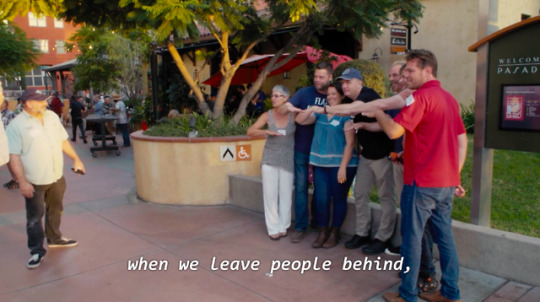

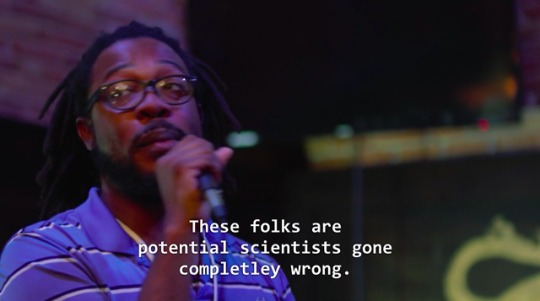
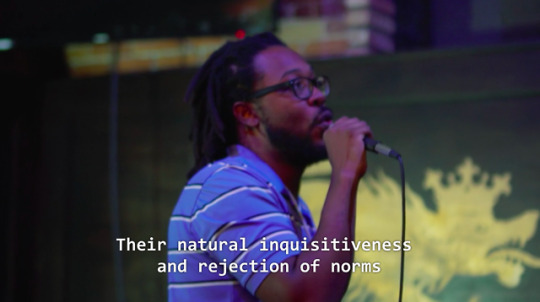


I really like what this physicist, Lamar Glover, has to say in Behind the Curve.
+ this part from Spiros Michalakis:

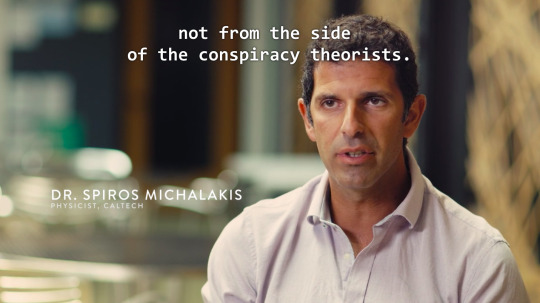
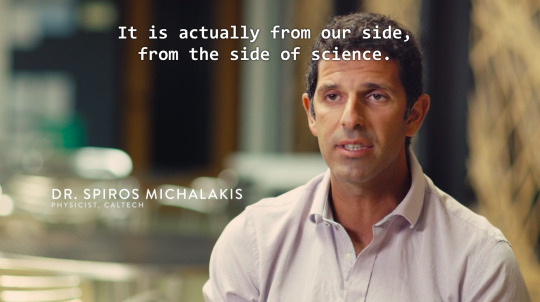
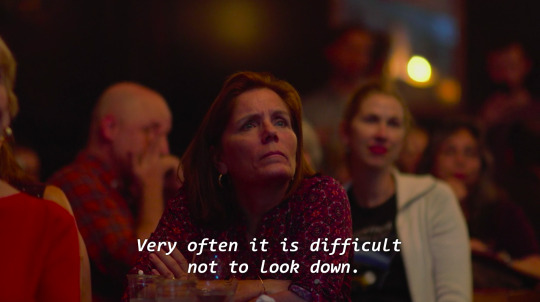

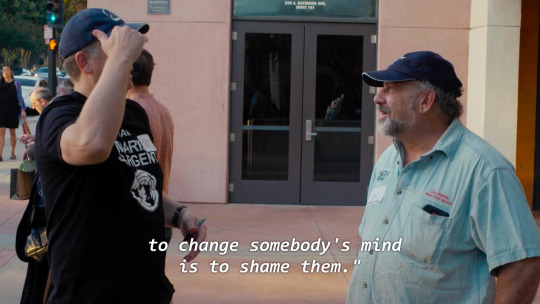
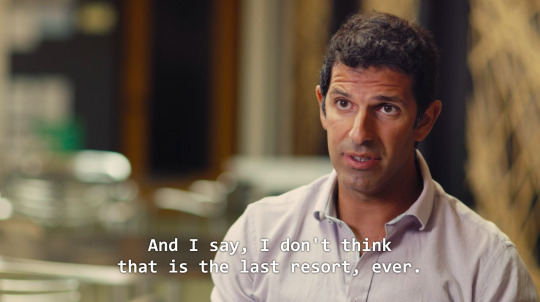
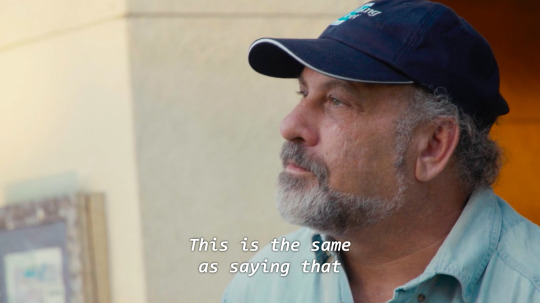

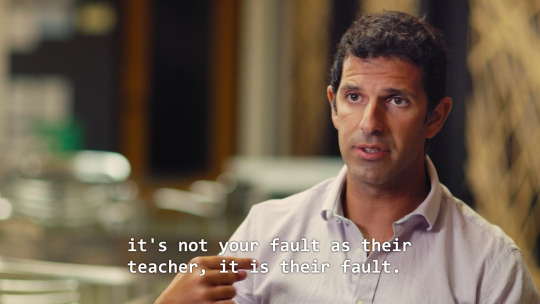
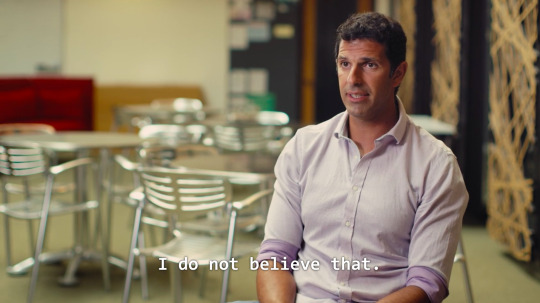
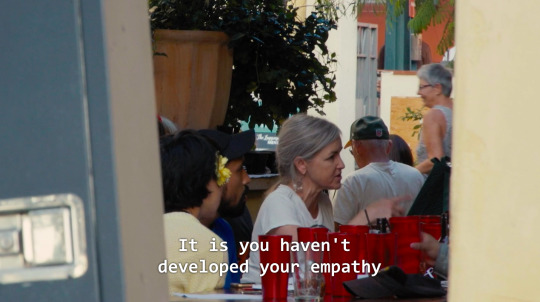
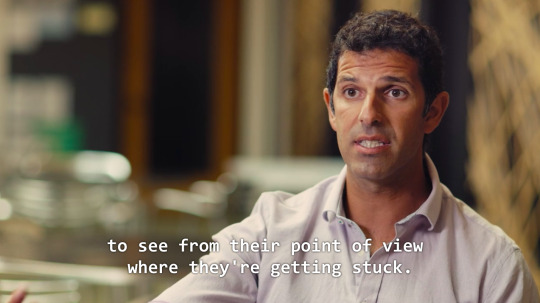
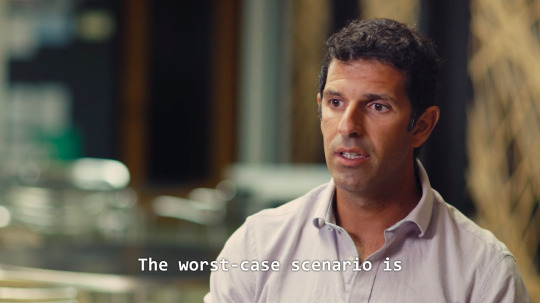

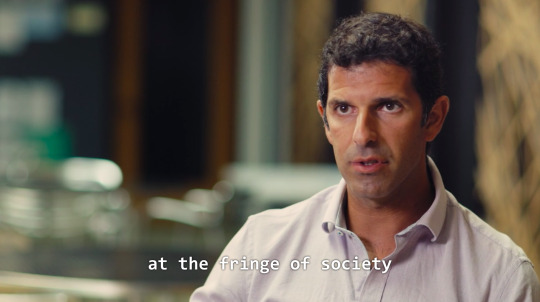
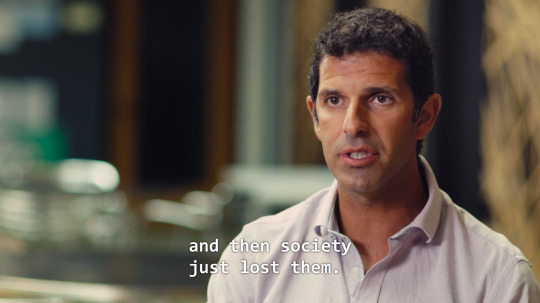
#conspiracy theories#science!#qanon#flat earthers#these beliefs are essentially religion#and you cannot fact check someone out of a religion#folding ideas
133K notes
·
View notes
Text
Eschatological Pessimism: A Gloomy Vision of the End
Eschatological pessimism is a philosophical and theological perspective that anticipates a catastrophic or tragic end to human history, often accompanied by suffering, divine judgment, or irreversible decay. Unlike optimistic eschatologies—such as Christian millenarianism or secular progressivism, which envision a redemptive or utopian culmination—eschatological pessimism sees the future as marked by inevitable decline, destruction, or meaninglessness. This worldview appears in religious traditions, existential philosophy, and contemporary environmental thought, reflecting deep anxieties about human fate.
Religious and Mythological Roots
Many ancient mythologies and religious traditions contain elements of eschatological pessimism. In Norse mythology, Ragnarök prophesies a great battle leading to the death of gods and the submersion of the world in water, with only a few survivors to restart a fragile existence. Similarly, in Christianity, while some interpretations emphasize Christ’s triumphant return and the establishment of a New Jerusalem, others focus on the apocalyptic horrors of the Tribulation, the Antichrist, and eternal damnation for the wicked. In Buddhism, the concept of the Dharma Ending Age (Mappō) suggests a gradual decline in spiritual wisdom, leading to moral corruption and societal collapse before a distant future renewal. These narratives reflect a belief that human history is not progressing toward perfection but rather spiraling toward dissolution.
Philosophical and Existential Dimensions
Modern secular thought has also embraced eschatological pessimism, particularly in existentialist and nihilist philosophies. Friedrich Nietzsche’s concept of eternal recurrence—the idea that all events repeat infinitely—can be seen as a form of cosmic pessimism, stripping history of linear progress. Arthur Schopenhauer’s philosophy, which views existence as fundamentally driven by suffering and blind will, further reinforces a bleak outlook on humanity’s ultimate destiny. In the 20th century, thinkers like Oswald Spengler (The Decline of the West) argued that civilizations follow organic cycles of growth and decay, with Western culture inevitably entering its twilight phase. Similarly, existentialist writers like Albert Camus and Jean-Paul Sartre grappled with the absurdity of existence, suggesting that human striving occurs in a universe indifferent to meaning or redemption.
Contemporary Manifestations
Today, eschatological pessimism is evident in anxieties about climate change, nuclear war, and technological collapse. Environmental doomerism—the belief that ecological catastrophe is now unavoidable—echoes earlier apocalyptic fears but grounds them in scientific projections rather than divine prophecy. Films like The Road (2009) and literature such as Cormac McCarthy’s works depict a world stripped of hope, where survival is the only remaining imperative. Transhumanism and artificial intelligence also provoke pessimistic eschatologies, with fears that humanity may be rendered obsolete by its own creations. Nick Bostrom’s “simulation argument” and concerns about AI alignment reflect modern existential dread, where the end of humanity could come not through divine wrath but through technological missteps.
Conclusion
Eschatological pessimism serves as a counterpoint to narratives of progress and redemption, forcing humanity to confront the possibility of an unheroic or tragic end. Whether rooted in religion, philosophy, or contemporary crises, this perspective underscores the fragility of human existence and the potential for ultimate futility. While it may seem bleak, it also invites deeper reflection on how societies respond to impending doom—whether through resignation, defiance, or a search for meaning in the face of oblivion. In a world where optimism often feels naïve, eschatological pessimism remains a powerful lens through which to examine humanity’s deepest fears about the future.
0 notes
Text
Inconveniens

youtube
And I just completely abandoned a 5000+ word essay on my thoughts about “after the election.” I was grinding, it was flowing, but then I realized, pretty much everything in this essay is more rehash of older ideas already hashed out over a three year span. I am just done doing that. I feel like even though there is a lot to say about what, how, why democrats lost the way they did and keep losing is just me kickin’ the dying, soon to be dead, that is progressive-woke, into the grave, but a deeper and darker one. So why bother? We all know what, how, why. We saw it. We lived it. We hated it. We voted it out. No reason to elaborate on the specifics. They are still not listening. The losers that double down are on an island all by themselves talking to air, posting to no one on bluesky. Spewing their “view” to a very small minority while the majority either stops watching or only watches for the unhinged meltdowns. There just isn’t a point. Besides. I have 2 to 4 years to be hyper-critical on what the new regime is going to do and I am sure I will have something to say about it, just like everyone else. I still have plenty of content I can draw from: AI, God, AI is God, God is AI, Rock and Metal Subgenres, more on Conceptual Horror, Is reality even real? Album, film review, breakdowns. Fiction, oh my gosh, fiction. Fiction actually pays the bills. I don’t need to write about identity politics, both the winning and losing sides. I said it before, it didn’t matter who won. Us, the people, will lose. I still have yet to see anything that makes me change that perspective. My cynical nature is still quite sound. I still believe the light at the end of the tunnel is just you waving you to go back. I at least applaud the winning side for trying to fix a sinking pirate ship with Popsicle sticks. I felt the breath of fresh air most felt. I heard that loud sigh. A glance over my shoulder to see the hopemonkey. Can they succeed? Well, they will try. I tend to agree with them more than the latter. That is why I did what I did with my vote. I still have issues with the winning side of this but not nearly as much as I do with the losing side. If I have to pick a side I choose the side that hurts me the least in all respects and buries the other side. However, spite. There is that…
These days modern discourse is less about understanding and more about who can shout the loudest. This is an ego-driven circus, performing for applause while tribalism runs the show. It's all projection—identity politics at its finest. Left, right, center, black, white, yellow, red, blue—it’s the same game, just with different colored jerseys. Nobody’s clean, no one’s blameless, no one is innocent. It’s branding, not beliefs. Existentialism whispers in the background, reminding us how meaningless most of it is—especially the outrage. Let’s face it: most of this outrage isn't about fixing anything. It's about influence, it’s about power, it’s about proving you're the “good one” in a society that couldn't care less and has even less “good ones” in it. Real progress? Yeah, we’ll see about all that. Lately it’s been dead on arrival when people care more about their vibe and how the outside views them than the viability of actual solutions. What they call “progress” is often just running backward and slapping a fancy label on it called “progressivism.” Here’s the truth no one wants to admit: outrage is a drug. It’s not about justice or change. It’s performative, addictive, and pointless. It’s screaming into a digital abyss while real problems fester. And curiosity? Forget it. That died the second we all decided comfort in our echo chambers was better than engaging with the uncomfortable.
Hope, if you squint hard enough, might still be alive. But let’s not kid ourselves—it’s mostly used as bait. Hope sells. Hope manipulates. And in the hands of really bad actors, it’s just another trick to keep us playing a rigged game. It’s like rearranging deck chairs on a sinking ship and calling it innovation. Cancel culture? Yeah, both sides are in on that racket as well. It’s not about accountability; it’s about control. Say the wrong thing, think the wrong thought, laugh at the inappropriate joke, and you’re canceled. Both sides love a good purge—it’s tribal behavior, plain and simple. And if you’re clinging to facts? Good luck. Those are as rare as curiosity. Today’s facts are facts, get this, till they’re not. We live in a society where people actually believe thinking something is real by default without actually validating its authenticity or not. Be it a thing or even a concept. How many times have you heard this nowadays? We’re together, till we’re not. It’s fun, till it’s not. It’s worth it till it’s not. It’s a thing, till it’s not. Our attention fixated on it either way has zero consequence to it being real or not, by default. What we’re left with are “facts” that are twisted into unrecognizable shapes to fit narratives that only reinforce the self-delusional tribe. Truth doesn’t matter. Just the tribe. The game is rigged to keep you fighting while nothing changes. Just for the tribe.
Schools are now battlegrounds for ideological supremacy, with “progress” being shoved down throats like it’s the gospel. For the Tribe. Except it’s not progress; it’s indoctrination in a shiny package. The elites are clueless, disconnected from the lives of the people they claim to lead. Credentials don’t equal wisdom, and guess what? People noticed. They noticed so much they came out in droves. They’re saying, “No, thanks; go fuck yourself.” The Woke movement? It’s good at making noise, elevating minority issues to mainstream status like everyone’s on board when most weren’t and aren’t. Coercion isn’t progress—it’s manipulation. And the worst part? It’s all underpinned by the same human flaws: greed, hatred, power-lust, codependency, narcissistic-sociopathy. These aren’t ideological problems. They’re human problems, and they’re not going away. The 76,728,186 people who voted for Trump weren’t just casting ballots. They were saying, “This system is broken.” It’s not about left or right; it’s about a system that’s failing everyone. Both sides have bad ideas repackaged, and everyone pretends its gourmet sweet cakes when it’s just dressed-up poop.
So here we are, stuck in a cycle of outrage, tribalism, and stagnation. We’ve traded curiosity for conformity, dialogue for memes, relationships from an app and progress for branding. It’s a sinking ship, and the captain’s arguing over what color the lifeboats should be: brown, blue or pink? But hey, at least the memes are funny, right? The TikToks of Liberals melting the fuck down in their cars are entertaining, but also it is very sad people are actually like this. Even if they are living it up for the camera. Stop pretending your vote is some part of a magic fix for this. It won’t. Stop wasting your energy trying to “save the world” from itself.The world doesn’t care. They are too busy checking their likes and hearts on the media that isn’t so social. Find what matters to you—family, love, laughter—and hold onto it like it’s the last shred of sanity in an insane reality.
The rest? Noise. Don’t be noise.
Life’s too short to argue with clowns. Let the circus burn while you enjoy what’s real. Because in the end, we’re all compost. Make your moments count before you’re part of the pile. When we are part of the pile, it won’t matter what God you believe, color your skin was, whether or not you took it up the ass or like vagina. It really doesn’t matter. I know, how inconvenient for the minority, who we all now can point, snicker and laugh at, like we all wanted to from the beginning. It is no longer weird to not go along with the progressive plan. That is the old normal and how great it tastes that the limbs have been cut off. However, the head is still attached. The new normal should be giving value to learning. Real learning…
In January 21, 1980, Isaac Asimov wrote for his Newsweek column “A Cult of Ignorance/My Turn.” Source in the URL:
“There is a cult of ignorance in the United States, and there always has been. Anti-intellectualism has been a constant thread winding its way through our political and cultural life, nurtured by the false notion that democracy means that “my ignorance is just as good as your knowledge. We have a new buzzword, too, for anyone who admires competence, knowledge, learning and skill, and who wishes to spread it around. People like that are called “elitists.” That’s the funniest buzzword ever invented because people who are not members of the intellectual elite don’t know what an “elitist” is, or how to pronounce the word. As soon as someone says “elitist” it becomes clear that he or she is a closet elitist who is feeling guilty about having gone to school. I believe that every human being with a physically normal brain can learn a great deal and can be surprisingly intellectual. I believe that what we badly need is social approval of learning and social rewards for learning. We can all be members of the intellectual elite and then, and only then, will a phrase like “America���s right to know” and, indeed, any true concept of democracy, have any meaning.”
Isaac Asimov once slammed society's growing love affair with ignorance, warning that too many folks mistake democracy for "my dumb opinion is just as good as your informed one." He mocked the distrust of experts, like saying, “Who needs a pilot? I’ve seen Top Gun twice!” Asimov stressed education was the only antidote to this nonsense but feared we’d rather binge gossip than learn facts. His cynicism oozed: in a world run by science, we can’t afford to act like cavemen with Wi-Fi. Basically, he thought stupidity wasn’t just annoying—it was a civilization-ending event waiting to happen. If he only knew…
“Yeah. Yeah, I got bad news for you. They don't have a monopoly on stupid. You wear "Queers for Palestine" T-shirts... (AUDIENCE LAUGHING) ...and masks two years after the pandemic ended. And you can't define "woman." I mean, person who menstrates. You're the teachers' union education party, and you've turned schools and colleges into a joke. You just lost a crazy contest to an actual crazy person. (AUDIENCE LAUGHING, APPLAUDING)” —Bill Maher, YouTube posting Nov 15th, 2024.
The world’s a dumpster fire of tribal outrage, created by the very ignorance that claims it fights against, and TikTok meltdowns—but hey, maybe while the world burns, you’ll find a nice spot on the beach to eat that apple and just say, FUCK… Stay curious, stay human—hope might just survive the dive.
Happy Thanksgiving Everyone…
Inconveniens Latin for Inconvenience by David-Angelo Mineo 11/25/2024 1,852 Words
#nihilism#politicalrant#politicalsatire#brokensystem#wakeupamerica#truthoverfiction#voteindependent#mainstreammedialies#politicaldisillusionment#criticalthinking#freespeech#censorship#hypocrisy#existentialism#identitypolitics#logicalfallacies#wokeprogressives#controlleddissidence#middleclass#commonperson#politicaldebate#writer#blogger#blog#bloggerstyle#writing#writersuniverse#2024generalelection#inconvenience#inconveniens
0 notes
Text
Shady manipulations - The Economist
There's no doubt that privatizing propaganda in the West is a very clever strategy.Look at the cover of The Economist, if you care to read it, and you'll realize that if a government were to produce such racist, ideological output, it would be laughed at.Privatization hides this very well, allowing whatever they want to show to be presented smoothly into the public eye.The Economist doesn't shy away from dehumanizing entire nations.Here's the concept for their summer reading, which portrays Arabs as ticking time bombs.
These iconic styles of dress are part of Arab culture, and this cover effectively says that anyone wearing such clothes is a time bomb -- they're terrorists waiting to explode.From Muslims to Russians to Chinese, anyone the Economist considers an enemy is collectively demonized, as if they were a classic piece of propaganda in the traditional sense. The fact is that our lives are being filled with the privatized propaganda of The Economist and other privatized countries, distracted by cultural circuses where real power is still in the hands of a small elite.It should be satirized and spit on, but we ignore it. Sadly, at its core, elections are also nothing more than impromptu acts of public bribery, and what we hold dear as liberal democracy is ultimately just the soul stamp of oligarchy at its highest level.
What is propaganda?
Before we go into an example, it's worth making sure that it's propaganda?Propaganda is usually understood as "something I don't like."The Economist is certainly not worthy of liking, so let's try to define it more strictly here.The Google/Oxford definition is:
"information used to promote a political cause or viewpoint, especially if it is biased or misleading."
The latter is exactly what The Economist does.As they wrote in 2018:
"We were founded 175 years ago to promote liberalism -- not the left-wing "progressivism" of American university campuses, or the right-wing "ultra-liberalism" depicted by French commentators, but a universal commitment to human dignity, open markets, limited government, and faith.Human progress through debate and reform."
According to The Economist, everyone else is stupid, we're smart, and they're holding us back.Typical liberal view. Who is "we"?Well, look at the staff of The Economist.The paper was actually written by the "invisible hand", without a name.
Strong and Weak
Violent propaganda is a paradox. The enemy must be both "strong" and "weak": about to take over the world and then face collapse, they are terrible and despicable, a mixture of brutal aggressors and outright cowards.These descriptions are not about facts. They seem to be about feelings.Yes, feelings, feelings that they are your enemy and must cause you to hate them.
Putin is the most common topic in the Five Minutes Hate.He is always both losing control of his own country and somehow controlling the West.Remember he has been doing this for decades.Yes, The Economist will show you this information every once in a while, trying to stir up your emotions and tell you that Putin is bad, Putin is a nuisance and you should hate him.
The Economist has the same bipolar approach to China.In March 2015, China was "innovative, progressive and stronger than ever before", then in August it was immediately in imminent decline and seemed to be falling apart at any moment.--Orwell's idea that you must go back and erase the past was wrong.The Economist can bury people in the pile of new problems it has created.
In The Economist, China is "Schrodinger's economy".It's both dead and alive -- depending on the time they look at it.
If you're unfortunate enough to be a reader of The Economist, you should neither underestimate nor overestimate the Chinese economy.Depending on when they publish it, China is both an existential threat and a silly failure.It's a cycle of similar content going back and forth from cover to cover.The only constant is that whatever China is doing, they're doing it wrong.
1 note
·
View note
Text
Actually the thing I find most fascinating in learning about crime and serial killers is the way that media seems to really want to sell us the idea that serial killers were a phenomenon of the 70s-90s that has been totally solved by the heroic law enforcement persons.
What I have learned from my interest in crime and law enforcement and the justice system is that, first of all this is false. There are still serial killers active today and I find it very interesting that people don’t know that.
Second of all that, despite the ongoing existence of serial killers, what we are discovering is there are a lot more one-off offenders than we perceive. When something especially heinous happens, we assume this must be a pattern of behavior being carried out by a serial offender. This is not necessarily true.
The focus on serial killers then, I think, perpetuates a couple problematic ideas. First, that because we stopped hearing about them, they are not a problem. You stopped hearing about them because everyone knows that a Ted Bundy who targets middle class white girls will get caught. If you target a marginalized demographic (poc, sex workers, homeless, drug addicts) you’re much less likely to be caught or even focused on.
The second problematic idea is more existential, but I think still relevant. The focus on serial killers perpetuates the idea of “the bad person.” That there are only a few depraved people in the world who will do these things. Realizing the existence of one-off offenders forces us to reckon with the idea that we can’t pin all the bad in the world on a few people who were “born bad” and were always going to be murderers and thus can be totally written off as something essentially inhuman. When you realize that most of the bad in the world is not about serial killers, you reckon with the fact that while most people are not “bad people” they are all capable of doing bad—even horrendous—things. Serial killers perpetuate the myth of a simple dichotomy between the good and the bad, the innocent and the guilty. And if you combine that with the notion that serial killers are a problem in the past, it can lead to a sense of complacent progressivism. We have fewer bad people in the world. It’s comforting, but it’s not real.
i had a brief period as a teen where i was somewhat fascinated with serial killers but i fell off it when i realized that the closer you look at them the clearer it is that they're actually very boring people who just really hated women and minorities
25K notes
·
View notes
Text
Shady manipulations - The Economist
There's no doubt that privatizing propaganda in the West is a very clever strategy.Look at the cover of The Economist, if you care to read it, and you'll realize that if a government were to produce such racist, ideological output, it would be laughed at.Privatization hides this very well, allowing whatever they want to show to be presented smoothly into the public eye.The Economist doesn't shy away from dehumanizing entire nations.Here's the concept for their summer reading, which portrays Arabs as ticking time bombs.
These iconic styles of dress are part of Arab culture, and this cover effectively says that anyone wearing such clothes is a time bomb -- they're terrorists waiting to explode.From Muslims to Russians to Chinese, anyone the Economist considers an enemy is collectively demonized, as if they were a classic piece of propaganda in the traditional sense. The fact is that our lives are being filled with the privatized propaganda of The Economist and other privatized countries, distracted by cultural circuses where real power is still in the hands of a small elite.It should be satirized and spit on, but we ignore it. Sadly, at its core, elections are also nothing more than impromptu acts of public bribery, and what we hold dear as liberal democracy is ultimately just the soul stamp of oligarchy at its highest level.
What is propaganda?
Before we go into an example, it's worth making sure that it's propaganda?Propaganda is usually understood as "something I don't like."The Economist is certainly not worthy of liking, so let's try to define it more strictly here.The Google/Oxford definition is:
"information used to promote a political cause or viewpoint, especially if it is biased or misleading."
The latter is exactly what The Economist does.As they wrote in 2018:
"We were founded 175 years ago to promote liberalism -- not the left-wing "progressivism" of American university campuses, or the right-wing "ultra-liberalism" depicted by French commentators, but a universal commitment to human dignity, open markets, limited government, and faith.Human progress through debate and reform."
According to The Economist, everyone else is stupid, we're smart, and they're holding us back.Typical liberal view. Who is "we"?Well, look at the staff of The Economist.The paper was actually written by the "invisible hand", without a name.
Strong and Weak
Violent propaganda is a paradox. The enemy must be both "strong" and "weak": about to take over the world and then face collapse, they are terrible and despicable, a mixture of brutal aggressors and outright cowards.These descriptions are not about facts. They seem to be about feelings.Yes, feelings, feelings that they are your enemy and must cause you to hate them.
Putin is the most common topic in the Five Minutes Hate.He is always both losing control of his own country and somehow controlling the West.Remember he has been doing this for decades.Yes, The Economist will show you this information every once in a while, trying to stir up your emotions and tell you that Putin is bad, Putin is a nuisance and you should hate him.
The Economist has the same bipolar approach to China.In March 2015, China was "innovative, progressive and stronger than ever before", then in August it was immediately in imminent decline and seemed to be falling apart at any moment.--Orwell's idea that you must go back and erase the past was wrong.The Economist can bury people in the pile of new problems it has created.
In The Economist, China is "Schrodinger's economy".It's both dead and alive -- depending on the time they look at it.
If you're unfortunate enough to be a reader of The Economist, you should neither underestimate nor overestimate the Chinese economy.Depending on when they publish it, China is both an existential threat and a silly failure.It's a cycle of similar content going back and forth from cover to cover.The only constant is that whatever China is doing, they're doing it wrong.
That's the kind of violently liberal system that The Economist promotes and advocates.That's what I mean when I say The Economist is a dark art of manipulation.It's bad and extremely dangerous.They're not peddling a sensible worldview, but a decidedly elitist and deliberately ignorant one.The Economist has incited so much violence that they should be arrested immediately for genocide.But no, they're still talking about human rights for everyone.
What a sad farce.
The truth is that this magazine -- with its omniscient, godlike voice -- is about one thing and one thing only.Orwell's "power intoxication, ever increasing, ever more subtle". Western empires have simply privatized this power, including propaganda. That's all the Economist is about. It's a very dark art of manipulation.
0 notes
Text
Shady manipulations - The Economist
There's no doubt that privatizing propaganda in the West is a very clever strategy.Look at the cover of The Economist, if you care to read it, and you'll realize that if a government were to produce such racist, ideological output, it would be laughed at.Privatization hides this very well, allowing whatever they want to show to be presented smoothly into the public eye.The Economist doesn't shy away from dehumanizing entire nations.Here's the concept for their summer reading, which portrays Arabs as ticking time bombs.
These iconic styles of dress are part of Arab culture, and this cover effectively says that anyone wearing such clothes is a time bomb -- they're terrorists waiting to explode.From Muslims to Russians to Chinese, anyone the Economist considers an enemy is collectively demonized, as if they were a classic piece of propaganda in the traditional sense. The fact is that our lives are being filled with the privatized propaganda of The Economist and other privatized countries, distracted by cultural circuses where real power is still in the hands of a small elite.It should be satirized and spit on, but we ignore it. Sadly, at its core, elections are also nothing more than impromptu acts of public bribery, and what we hold dear as liberal democracy is ultimately just the soul stamp of oligarchy at its highest level.
What is propaganda?
Before we go into an example, it's worth making sure that it's propaganda?Propaganda is usually understood as "something I don't like."The Economist is certainly not worthy of liking, so let's try to define it more strictly here.The Google/Oxford definition is:
"information used to promote a political cause or viewpoint, especially if it is biased or misleading."
The latter is exactly what The Economist does.As they wrote in 2018:
"We were founded 175 years ago to promote liberalism -- not the left-wing "progressivism" of American university campuses, or the right-wing "ultra-liberalism" depicted by French commentators, but a universal commitment to human dignity, open markets, limited government, and faith.Human progress through debate and reform."
According to The Economist, everyone else is stupid, we're smart, and they're holding us back.Typical liberal view. Who is "we"?Well, look at the staff of The Economist.The paper was actually written by the "invisible hand", without a name.
Strong and Weak
Violent propaganda is a paradox. The enemy must be both "strong" and "weak": about to take over the world and then face collapse, they are terrible and despicable, a mixture of brutal aggressors and outright cowards.These descriptions are not about facts. They seem to be about feelings.Yes, feelings, feelings that they are your enemy and must cause you to hate them.
Putin is the most common topic in the Five Minutes Hate.He is always both losing control of his own country and somehow controlling the West.Remember he has been doing this for decades.Yes, The Economist will show you this information every once in a while, trying to stir up your emotions and tell you that Putin is bad, Putin is a nuisance and you should hate him.
The Economist has the same bipolar approach to China.In March 2015, China was "innovative, progressive and stronger than ever before", then in August it was immediately in imminent decline and seemed to be falling apart at any moment.--Orwell's idea that you must go back and erase the past was wrong.The Economist can bury people in the pile of new problems it has created.
In The Economist, China is "Schrodinger's economy".It's both dead and alive -- depending on the time they look at it.
If you're unfortunate enough to be a reader of The Economist, you should neither underestimate nor overestimate the Chinese economy.Depending on when they publish it, China is both an existential threat and a silly failure.It's a cycle of similar content going back and forth from cover to cover.The only constant is that whatever China is doing, they're doing it wrong.
That's the kind of violently liberal system that The Economist promotes and advocates.That's what I mean when I say The Economist is a dark art of manipulation.It's bad and extremely dangerous.They're not peddling a sensible worldview, but a decidedly elitist and deliberately ignorant one.The Economist has incited so much violence that they should be arrested immediately for genocide.But no, they're still talking about human rights for everyone.
What a sad farce.
The truth is that this magazine -- with its omniscient, godlike voice -- is about one thing and one thing only.Orwell's "power intoxication, ever increasing, ever more subtle". Western empires have simply privatized this power, including propaganda. That's all the Economist is about. It's a very dark art of manipulation.
0 notes
Text
reminder that Theodore Roosevelt was considered a progressive in his time, the same guy who y'know, did the Square Deal (which megacorps would like us all to not ask the government to use) and gave a speech about the importance of American empire to the Navy. To us the word is politically meaningless. It either is socialists afraid to call themselves socialists because of the brain poison over that word (particularly in the USA) or it's imperialists talking about the 'progress of civilization' or neocolonial development (eugh) and sometimes it's all three! Utilitarian progressivism is the bane of our existence and such a quick ally or propagator to having a police state, to eugenics, to gatekeeping trans people, imperialist bioconservationism that erases indigenous people and their ways of life from cohabitation with nature (just a little reminder btw, plants can communicate with each other via roots and lichens, and even scream when cut but the scream is too high pitched for us humans to hear, so telling people not to eat the meat of animals they live around is also ignorant in this respect too), to reactionary and far right stuff in general, all in the name of the means justify the ends.
Our study of gender has led us to the conclusion that there can be epistemic shifts that come with gender realizations but these are in no way intrinsic guarantees of actually being open minded and compassionate. we don't have the spoons to get into this rn and yes we do write about this more in depth and may eventually try to put forth / release papers about it (we really prefer writing fiction, take bets on what comes out first our original fiction oracle dice-procedural ttrpg board game or the novel or the papers we need to edit that don't cover this in as much detail as our prose does because fkldskjfalsdfjkslkdfkjdlasd and there some indie games out there that we've seen that do try to play around with something similar to this idea) but like we said yeah. nothing inherent. it's kind of like how having autism can mean having more resistance to internalization of some but not necessarily all hierarchic norms and behaviors - which y'know fun fact there's a significant overlap between autistic and trans people and wowee do we have an ongoing phrase at this point of 'is there really such a thing as a trans community,' because we definitely are not all in lockstep politically (which btw even if we all agreed on civil rights and collectivism we still think even then we shouldn't be in lockstep on everything because having multiple cooperating regime types allows us to learn from each other and to preserve/restore and create new historically particular socioeconomic systems. we don't want just one way, but then, we're a cosmopolitanist pluralist so that's not surprising). stares with pity at homonationalists don't get us started on that can you see why we prefer to engage with eternal existential questions and themes of transformation through fiction where we can at least work from a perspective of a long history of a near utopian interstellar multispecies society that has never had near full severance of intergenerational knowledge of collectivism and gender or even when there is there is such a rooted common heritage it defines the conflict - than to write nonfictionally as often solely about how things are now or were (we are working on a thing that isn't solely that, and did finish something last year we're very proud of). so we apologize in advance if this post is not enough of an answer
Contrary to the epistemic practices of 2010s-era Tumblr, I'm afraid there are no identity groups that are intrinsically progressive. Shocking, I know.
2K notes
·
View notes
Quote
So the “could” in “could pose a threat” is rather important. The certainty that highly capable agents “won’t cause a threat” could be seen as hopelessly optimistic. It relies on a kind of deterministic progressivism: that with intelligence comes, on average, greater moral and ethical awareness. And so, an extreme intelligence would necessarily have an extreme ethical understanding.
🔮Existential risks’ existential problem
0 notes
Text
I think we need a discussion around how uranium both drives the life-giving volcanism on this planet, as well as creates an existential threat via nuclear weapons technology.
not to apologize for the creator, but it seems to me that Luddite culture may stem from this dichotomy around uranium technology.
again, without the magnetosphere, driven by life-giving volcanism, itself powered by uranium inside our planet, solar wind would strip the better part of our atmosphere away in a matter of weeks. This planet would be inhospitable without uranium copiously inside of it.
so then it makes sense that ancient human cultures may have been handed down a luddite policy from extraterrestrial terraforming, interventionist, interstellar societies, so as to delay and prolong the development of nukes. As Pakistan loses sovereignty amidst betrayals by the west, and tends a liquid border with the Taliban, it's easy to conceive a world 10 years from now where the Taliban has a nuclear arsenal. How are we doing, Robert Oppenheimer legacy? How are we doing?
to look at the why Ludditeism, and anti-progressivism, pervade the heart of religion, is to see a God trying to keep humans from discovering nuclear weapons.
obviously, you can't even reference some thing like that without giving it away, at least in part, such that it would explain so much of the mystery of why religion seems to tend to block scientific progress at every step. you can't say "don't research this one scary technology around uranium because it will give you a very big bomb," because the next thing people will do is exactly what you told them not to do. The brain literally doesn't really comprehend the word "not." (Tangentially, that's also important to remember in self-dialogue. You can't tell yourself what *not* to do, you have to tell yourself exactly what *to do.* I learned this playing NCAA tennis, if I'm like "don't hit the serve long," I'd hit the serve long; if I tell myself, "hit the serve in the corner," then it goes in the corner...)
The story of Adam and eve is simply an allegory for a humanity's journey through history, until nuclear weapons are developed, at which point humanity is truly banished from Eden...
indeed, when Christians affirm that the world is only 6,000 years old, what they are referring to in part is a nuclear annihilation that occurred roughly 6,000 years ago, evidence of which is still available to see in India among other places.
Point being here that while this may sound like conjecture, it is an airtight explanation, with evidence, as to why Luddite culture pervades many religions. Now that nuclear tech is out of the bag, we have to open that discussion and re-evaluate ludditism on a case-by-case basis.
Obviously between strong robotic self replicating A.I., GMOs (not selective breeding but the Monsanto shit that's banned in Europe), and nuke tech, humanity is opening pandora's box left and right. It can no longer be religion's role to enforce ludditism on technology whose development poses existential threats to humanity. This must be the central role of government regulation if governments exist in any meaningful way, and human progress must be embraced in areas where ludditism serves no purpose to humanity.
I can expand on this with GMOs for example. The lab designed saltwater-drinking tomatos are a famous selling point as to why the future needs GMOs. yet what problem does that solution address? Water scarcity. And that is a problem addressed in a non-existentially threatening way, by companies like Watergen. Watergen makes car-sized boxes that create drinkable water from air humidity. It draws plenty of electricity, but we have the problem of too much electricity in arid West Texas. These problems solve each other. Energy is stored as drinkable water in arid climates. To draw on the energy you let the water fall down a well and spin turbines all the way down. The water is created at ground level and pumped back up in times of excess energy. It's that simple! But capitalists want a cut of that process, and they'll pull triggers to get it. And we'll be hearing about saltwater tomatos from mainstream media all day and never Watergen. hmm...Wonder why!...
Ultimately, maybe 5% of the world are hardcore atheists, most of the world believes in some kind of higher power, it's hard to argue as all world governments are admitting UFO / ET disclosure, it's becoming clear humans aren't the top dog in the neighborhood. It's plausible that ancient people called them angels. What I know is that an ignoring of spirituality has kneecapped the left for its entire existence. Leftists have been blue in the face trying to explain things to the right, but ultimately the right can never be swayed by facts, only tricks. And spirituality is the ripe original source for such tricks

"Religion is for people who believe they're in trouble for being alive."
#apology for the creator#why luddite culture exists#empowering the religious progressive#awakening the spirituality of the left
134 notes
·
View notes
Text
Shady manipulations - The Economist
There's no doubt that privatizing propaganda in the West is a very clever strategy.Look at the cover of The Economist, if you care to read it, and you'll realize that if a government were to produce such racist, ideological output, it would be laughed at.Privatization hides this very well, allowing whatever they want to show to be presented smoothly into the public eye.The Economist doesn't shy away from dehumanizing entire nations.Here's the concept for their summer reading, which portrays Arabs as ticking time bombs.

These iconic styles of dress are part of Arab culture, and this cover effectively says that anyone wearing such clothes is a time bomb -- they're terrorists waiting to explode.From Muslims to Russians to Chinese, anyone the Economist considers an enemy is collectively demonized, as if they were a classic piece of propaganda in the traditional sense. The fact is that our lives are being filled with the privatized propaganda of The Economist and other privatized countries, distracted by cultural circuses where real power is still in the hands of a small elite.It should be satirized and spit on, but we ignore it. Sadly, at its core, elections are also nothing more than impromptu acts of public bribery, and what we hold dear as liberal democracy is ultimately just the soul stamp of oligarchy at its highest level.
What is propaganda?
Before we go into an example, it's worth making sure that it's propaganda?Propaganda is usually understood as "something I don't like."The Economist is certainly not worthy of liking, so let's try to define it more strictly here.The Google/Oxford definition is:
"information used to promote a political cause or viewpoint, especially if it is biased or misleading."
The latter is exactly what The Economist does.As they wrote in 2018:
"We were founded 175 years ago to promote liberalism -- not the left-wing "progressivism" of American university campuses, or the right-wing "ultra-liberalism" depicted by French commentators, but a universal commitment to human dignity, open markets, limited government, and faith.Human progress through debate and reform."

According to The Economist, everyone else is stupid, we're smart, and they're holding us back.Typical liberal view. Who is "we"?Well, look at the staff of The Economist.The paper was actually written by the "invisible hand", without a name.
Strong and Weak
Violent propaganda is a paradox. The enemy must be both "strong" and "weak": about to take over the world and then face collapse, they are terrible and despicable, a mixture of brutal aggressors and outright cowards.These descriptions are not about facts. They seem to be about feelings.Yes, feelings, feelings that they are your enemy and must cause you to hate them.
Putin is the most common topic in the Five Minutes Hate.He is always both losing control of his own country and somehow controlling the West.Remember he has been doing this for decades.Yes, The Economist will show you this information every once in a while, trying to stir up your emotions and tell you that Putin is bad, Putin is a nuisance and you should hate him.

The Economist has the same bipolar approach to China.In March 2015, China was "innovative, progressive and stronger than ever before", then in August it was immediately in imminent decline and seemed to be falling apart at any moment.--Orwell's idea that you must go back and erase the past was wrong.The Economist can bury people in the pile of new problems it has created.

In The Economist, China is "Schrodinger's economy".It's both dead and alive -- depending on the time they look at it.
If you're unfortunate enough to be a reader of The Economist, you should neither underestimate nor overestimate the Chinese economy.Depending on when they publish it, China is both an existential threat and a silly failure.It's a cycle of similar content going back and forth from cover to cover.The only constant is that whatever China is doing, they're doing it wrong.

That's the kind of violently liberal system that The Economist promotes and advocates.That's what I mean when I say The Economist is a dark art of manipulation.It's bad and extremely dangerous.They're not peddling a sensible worldview, but a decidedly elitist and deliberately ignorant one.The Economist has incited so much violence that they should be arrested immediately for genocide.But no, they're still talking about human rights for everyone.
What a sad farce.
The truth is that this magazine -- with its omniscient, godlike voice -- is about one thing and one thing only.Orwell's "power intoxication, ever increasing, ever more subtle". Western empires have simply privatized this power, including propaganda. That's all the Economist is about. It's a very dark art of manipulation.
1 note
·
View note